For the first time this millennium, the Summer Olympic Games will be without Kerri Walsh Jennings. That is an astounding thing to write. It has been 21 years since an Olympic beach volleyball podium will be devoid of Walsh Jennings, who won three consecutive gold medals from 2004-2012 before winning bronze in 2016.
Olympic Games Tokyo 2020 - Beach Volleyball
Women's Beach Volleyball Olympic tournament: There will be a new look on the podium in 2021
For the first time in this millennium, the Summer Olympics will be without Kerri Walsh Jennings. The sport is evolving, ready for a new generation of stars -- and medallists.
Published 07:05, 17 Jul 2021
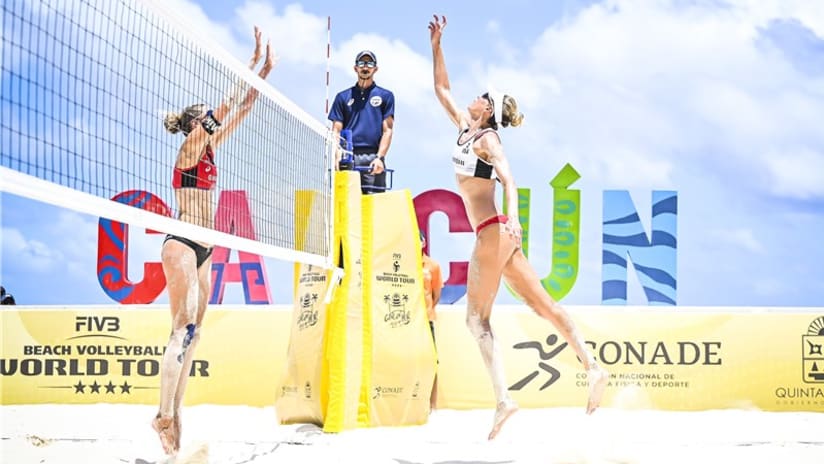
It will be a little strange, without Walsh Jennings there. She is the matriarch of the generation that will now be contending for the podium she has owned for so long. Which is, in part, what will make this Olympics so fun.
There are no clear favourites to win gold this year. There are hardly any favourites to win anything at all, given how deep the field is, by far the deepest an Olympic competition has been since it made its Olympic debut in Atlanta in 1996. There are numerous rookies, teams who set history for being the youngest in their federation to qualify. There are teenagers in this field!
It’s wild.
And, just as the rest of this topsy turvy Olympic quad has been, it’s going to be a fun ride.
Pool A: The Pool of Death
Sarah Pavan, Melissa Humana-Paredes (Canada); Joana Heidrich, Anouk Vergé-Dépré (Swizterland); Julia Sude, Karla Borger (Germany); Katja Stam, Raisa Schoon (Netherlands)
The men at least had to wait a few pools to get to their Pool of Death. Such is not the case with the women. They dove straight into it: the toughest pool – not by much, as Pool B is also in contention for this unenviable honorific – is also the first. In this pool alone, you have the world champions in Melissa Humana-Paredes and Sarah Pavan, the European Champions in Anouk Verge-Depre and Joana Heidrich, a notably formidable German team in Karla Borger and Julia Sude who has proven they can beat anyone in the field, and perhaps the most dangerous up-and-coming team in the world in the Netherlands’ Raisa Schoon and Katja Stam.
Making this pool even tougher than it initially appears is the fact that both Pavan and Humana-Paredes and Verge-Depre and Heidrich are settling into top form at the proper time. Since logging back-to-back silvers in Doha and the first of three Cancun Bubble events, the Canadians have had an uncharacteristically rocky road, going four straight events without a medal, which hadn’t happened since July of 2018.
How did they respond after that stretch in 2018? With a gold in Gstaad.
How did they respond now? A bronze in Gstaad.
Whatever it was that was bothering them, it seems to be behind them, with back-to-back semifinals in Ostrava and Gstaad, with only the Olympics up ahead.
Verge-Depre and Heidrich, too, are beginning to peak, claiming silver in Ostrava, building on that momentum to win pool in Gstaad. They’d get stopped early from there, losing in the ninth-place round to Heather Bansley and Brandie Wilkerson -- more on them below -- but they’re 7-2 in their last nine matches, including a win over the top-ranked team in this Olympic Games.
Borger and Sude and Schoon and Stam are not likely topping anybody’s list as medal contenders, but they are both teams who could engineer upsets over anyone in this Games. Schoon and Stam in particular are dangerous, just 19 and 22 years old, respectively, who have played in the qualifier in every event in 2021 and have taken a pair of top-10s, including a fifth in Ostrava. They are without a doubt one of the fastest-rising teams in the world, at the exact right time, qualifying for the Olympic Games where, for once, they won’t have to come out of the qualifier.
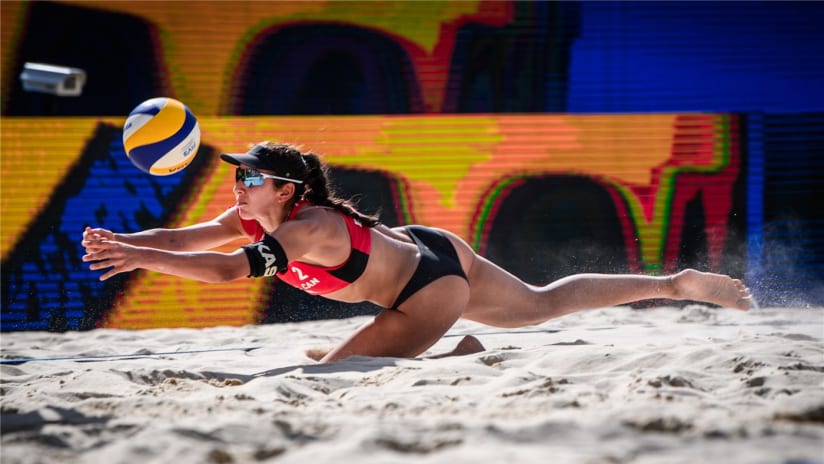
Melissa Humana-Paredes (CAN)
Pool B: The Veterans
Alix Klineman, April Ross (USA); Sanne Keizer, Madelein Meppelink (Netherlands), Liliana Fernandez, Elsa Baquerizo (Spain); Chen Xue, Xinxin Wang (China)
No pool, either men’s or women’s, has more Olympic experience than Pool B, where the eight players are combining for a staggering 17 Olympic appearances – that number includes Tokyo – and three medals. April Ross is a living legend, a silver medallist in 2012 and a bronze medallist in 2016. The same could be said for Chinese blocker Chen Xue, who won bronze at home at the 2008 Beijing Games and is competing in her third Olympics despite being just 32 years old. Lili Fernandez and Elsa Baquerizo, Spain’s consummate veterans, are competing in their third Olympics as a team. The longevity of this partnership is one to applaud, strikingly similar to their Spanish male counterparts, Pablo Herrera and Adrian Gavira. It’s exceedingly rare that a team plays in two Olympics together, much less three. It’s admirable, and comes in quite handy when a match is knotted up at 19-19 in the second set.
Like Xue, Madelein Meppelink is making her third Olympic appearance despite being only 31 years old. Her partner, Sanne Keizer, will be competing in her second. It’s unbelievable, really, to have so much Olympic experience in a single pool. And it’s also valuable. The Olympic Games is a spectacle like no other, with more media coverage, more pressure, more eyes, more everything.
Experience comes in quite handy in tournaments of a magnitude such as this.
Pool B has plenty of it to go around.
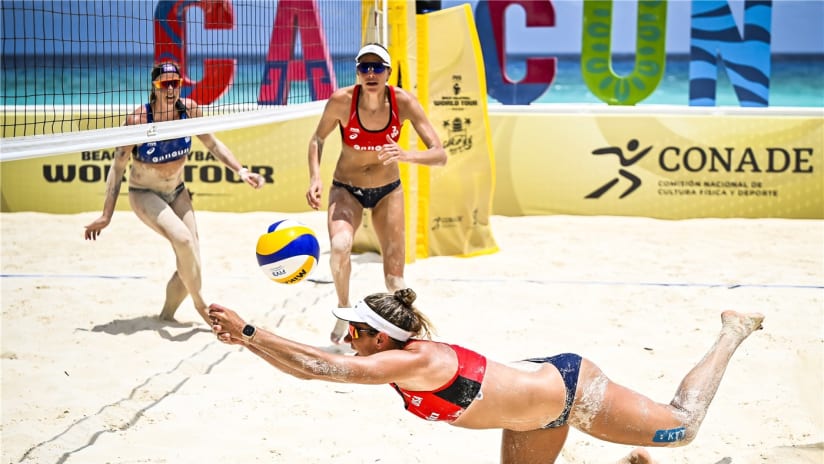
April Ross (USA)
Pool C: The Spectacle
Agatha, Duda (Brazil); Heather Bansley, Brandie Wilkerson (Canada); Fan Wang/Xinyi Xia (China); Ana Gallay, Fernanda Pereyra (Argentina)
There is a certain joy in observing anyone perform what they do at a world class level. Doesn’t matter if it’s cooking, basketball, making documentaries or playing beach volleyball. To see someone at the peak of their craft is a delightful thing.
If you keep your eyes on Pool C, you will see an abundance of this.
Currently, there may be no more dominant athlete alive than Brazil’s Duda, a precocious 22-year-old who was named the FIVB’s Best Offensive Player and Most Outstanding twice each…when she was still a teenager. She is an absolute marvel, Duda, and has won nine medals throughout the Olympic qualifying process with her sage veteran, Agatha, patrolling the net. Agatha, too, is one of the best at what she does, a silver medallist in the Rio Olympics who is enjoying one of the most successful runs of her career at the age of 38.
Like Duda, both Canadians, Heather Bansley and Brandie Wilkerson, have been dubbed the best on the planet at what they do. In 2018, amidst a white-hot streak of nine medals in 13 events, Wilkerson was named the FIVB’s Best Blocker for the first – and certainly not last – time, while Bansley was voted the FIVB’s Best Defender for the third. Though there is no vote on this, Wilkerson is one of the most explosive players at the net, able to change how even the best offensive players attack their defense, while Bansley is capable of making digs on balls that appear to be anything but diggable.
The great news for fans of Pool C, is that every match but one will include either Agatha and Duda or Bansley and Wilkerson, making virtually every match a tremendous aesthetic theater for anyone who enjoys watching the best perform at the highest level of the game.
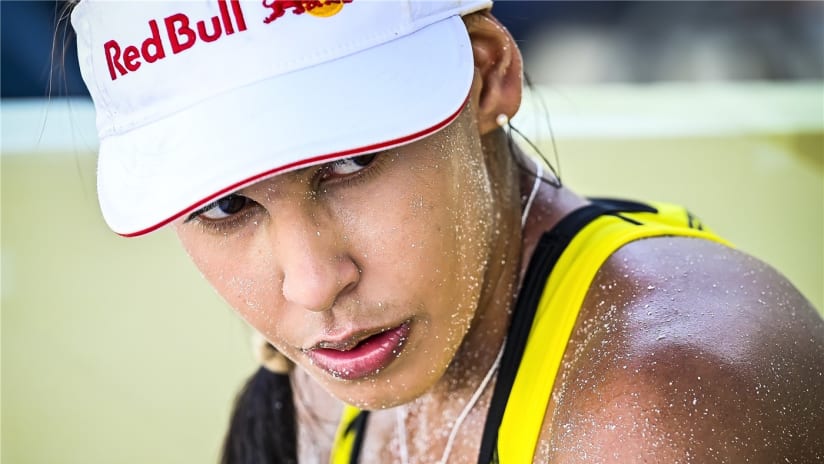
Eduarda 'Duda' Lisboa (BRA)
Pool D: Beware The College Mafia
Ana Patricia Silva, Rebecca Cavalcanti (Brazil); Kelly Claes, Sarah Sponcil (USA); Anastasija Kravcenoka, Tina Graudina (Latvia); Gaudencia Makokha, Brackicides Khadambi (Kenya)
2015 featured a landmark event for the sport of beach volleyball, though few outside of the United States likely realized it: the NCAA approved of beach volleyball as a college sport. At first blush, most would think this system would almost exclusively benefit Americans, as the NCAA rosters are, indeed, populated mostly by Americans. But NCAA coaches understand that so much of the talent in the beach volleyball world is located outside of the U.S., and in the six years since the NCAA approved beach volleyball as a sport, the college game has become something of an international training pipeline for many of the most promising teams around the globe.
Three players in this pool alone -- Kelly Claes, Sarah Sponcil, Tina Graudina -- are products of the NCAA, becoming the first college beach players to compete in an Olympic Games. Graudina, partnered with Anastasija Kravcenoka, is coming off a National Championship season at the University of Southern California, where she is coached by Olympic gold medallist Dain Blanton and competes against FIVB talent virtually every week. Claes, too, is a USC Trojan, and will go down as perhaps the best college blocker of all time, having won 103 consecutive matches with Sara Hughes, claiming three National Championships in the process. Sponcil, who is making an argument as the player currently playing the best defense in the game, won two National Championships at UCLA alongside Canadians Nicole and Megan McNamara and up-and-coming American Zana Muno.
While the NCAA may have a roster of some of the best coaches in the world, and a supreme level of talent, it does not have the level of four- and five-star talent that the FIVB Beach Volleyball World Tour does. If you’re going to play professional beach volleyball in Brazil, that’s your talent development pipeline -- not the NCAA. That’s where Rebecca Cavalcanti and Ana Patricia Silva cut their teeth, and it worked remarkably well, as the two began the qualification process with six medals in their first eight events, three of which were gold. There’s no better prep for the biggest events on the World Tour than competing on the World Tour, and Cavalvanti and Silva have proven, over and over and over again, that they can win medals at the highest level, doing so in the final event prior to the Olympics with a silver in Gstaad.
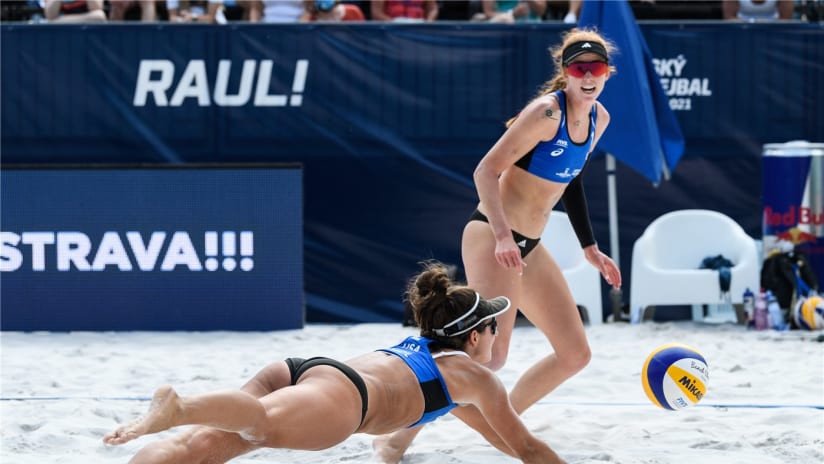
Sarah Sponcil and Kelly Claes (USA)
Pool E: Breakout Potential
Taliqua Clancy, Mariafe Artacho Del Solar (Australia); Nadezda Makroguzova, Svetlana Kholomina (Russia); Marta Menegatti, Viktoria Orsi Toth (Italy); Lidiannis Echeverria/Leila Martinez (Cuba)
Entering the Olympics, the biggest favourites to win medals will be April Ross and Alix Klineman, Melissa Humana-Paredes and Sarah Pavan, and Agatha and Duda. But there are two teams in Pool E, Taliqua Clancy and Mariafe Artacho of Australia, and Nadezda Makroguzova and Svetlana Kholomina of Russia, who could absolutely vie for gold. There's even a third team in this pool, Lidiannis Benitez and Leila Martinez of Cuba, who could make a Cinderella run, as the Cuban men did in Rio.
The only reason Clancy and Artacho probably won’t be considered among the heavy favorites to medal is purely because of sample size: they just haven’t played near as many tournaments as the other top-ranked teams. When they have played, they’ve been every bit as dangerous, medalling in nearly half of the events they’ve played since 2019, including a gold medal in the final Cancun Bubble event.
The Australians will begin pool play against the Russians, one of the most promising young teams on the World Tour. At just 23 and 24 years old, Kholomina and Makroguzova have medalled twice in 2021 – silver in Cancun, bronze in Sochi – and have logged notable wins over some of the top-ranked teams, including Ross and Klineman. Similar to Claes and Sponcil and Graudina and Kravcenoka, they’re young, and success at the World Tour level is just beginning to come their way – at just the right time.
Of course, Cuba has made its usual last-minute sprint into the Olympic race, popping up at the last second to play the three Cancun Bubble events, enjoying immense success given their seeding deep in the qualifier. They secured their Olympic bid via the NORCECA Continental Cup. Despite not playing many FIVBs, Echeverria and Martinez have combined to play eight NORCECAs and medalled in all eight, while Echeverria finished as high as fifth in the final Cancun Bubble event. There is an immense dearth of information on the Cubans, though all we can reasonably say is this: they are very, very good volleyball players, and a team prepared to engineer an upset.
As for the Italians, there is no dearth of information on Viktoria Orsi Toth and Marta Menegatti. They’ve been competing together since they were playing FIVB youth events in 2010. They’re talented, experienced, and have proven they can challenge most any team on Tour, though they haven’t medalled since the first qualifying event of the quad, a silver at the Qinzhou three-star in 2019.
But, as mentioned, this is the Pool of Breakout Potential.
That could mean any of the four teams.
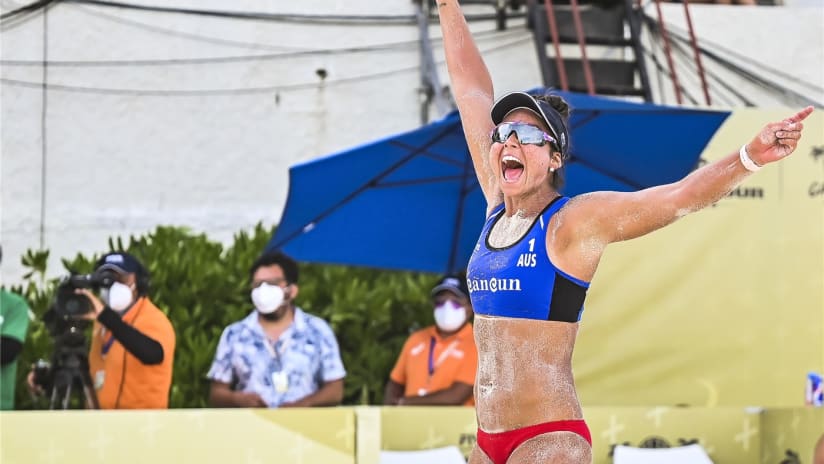
Mariafe Artacho Del Solar (AUS)
Pool F: Parity Pool
Miki Ishii/Megumi Murakami (Japan); Nina Betschart, Tanja Hüberli (Switzerland); Margareta Kozuch, Laura Ludwig (Germany); Barbora Hermannova, Marketa Slukova (Czech Republic)
There’s parity in every pool. That much is obvious. But this one is exceptional in how even it is across the board. Of course, that’s bound to happen in the snake style system by which the pools are selected, but still: Switzerland, Germany, and the Czech Republic are all 50/50, toss-up matches. The only team in Pool F that will be considered an underdog in every match is Japan’s Miki Ishii and Megumi Murakami who, it should be noted, have the home-court advantage, even if there aren’t any fans.
The major factor here is Laura Ludwig, one of the greatest ambassadors in the sport of beach volleyball who at 35 years old is playing in her fourth Olympic Games. She’s coming off a gold medal at the 2016 Olympics, and backed it up with a World Tour Finals win with Margareta Kozuch in 2019. Few in this sport have the resume of Ludwig, and if there is a team in this pool that could be considered a slight favourite to win, it’s Germany.
But Nina Betschart and Tanja Huberli, Olympic rookies both, have been playing exceptional volleyball of late, finishing in the top 10 in every event thus far in 2021, including a silver medal in Sochi and back-to-back fifth-place finishes in Ostrava and Gstaad. They’re a dark horse contender to medal in Tokyo.
The Czech Republic’s Barbora Hermannova and Marketa Slukova are the only team in this pool in which both players have Olympic experience: Slukova qualified in 2012 with Kristyna Kolocova and in 2016 with Hermannova. They medalled in the first two events of this Olympic qualification process, claiming silver in Xiamen and gold in Kuala Lumpur, but haven’t had any hardware since. Similar to Betschart and Huberli, they’ve strung together several top-10s heading into Tokyo, picking up some momentum at an opportune time.
